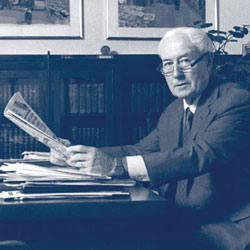The University Board of Trustees voted to retain the name of Woodrow Wilson Hall after months spent reconsidering the controversial legacy of former president Woodrow Wilson. The decision was made at a Board of Trustees meeting on June 23.
Similar events have occurred at universities across the nation. This year Princeton University refused student demands to change the name of Woodrow Wilson School of Public and International Affairs, but agreed to remove a mural of Wilson from a dining hall. Then in May, hundreds of students at Yale protested the school’s decision to keep Calhoun College named after John C. Calhoun, an 18th century slavery supporter.
Although Wilson won a Nobel Peace Prize for his work during World War I as well as motivated the creation of the Federal Reserve, he also segregated the federal government and was a supporter of the Ku Klux Klan.
“It is impossible to disentangle his foreign policy achievements from a racism that helped to retard the development of American democracy,” said Hettie Williams, a lecturer of History and Anthropology. “Both primary and secondary sources indicate that Wilson’s attitude on race was regressive for his time, and more in line with the ideology of the new Ku Klux Klan.”
According to Henry Mercer, Board of Trustees Chair, the conversations on Wilson are not over. In a press release he stated, “I am proud that our entire Board chose to proactively examine Wilson’s legacy with the help of faculty, students, and staff members.” He added, “From this we know that we have a responsibility to tell Wilson’s full story, the good and bad. This provides a valuable learning opportunity for the Monmouth University community.”
In early December 2015, University President Paul Brown, Ph.D. held campus wide gatherings to discuss the possibility of changing the name of the hall. The Board eventually drew their conclusion from opinions made at various open forums, which included faculty, students, and alumni.
“A very common refrain from our alumni was that while Wilson’s racist views are abhorrent, he was a product of his time, and that judging the values of a previous era by our own standards could lead toward the path of erasing unpleasant facts of history, which is never an appropriate action for any academic institution,” said Brown.
In the summer of 1916, Wilson summered on the grounds that Wilson Hall was built on. “Woodrow Wilson never resided in the current structure that now stands on our campus and this is a well-known fact, although he did summer in the region in the previous building before it was destroyed in a fire,” said Williams.
Following the fire of Woodrow Wilson’s one-time summer home, Woodrow Wilson Hall formerly known as Shadow Lawn was built in 1929 by Philadelphia architect Horace Trumbauer and his chief designer Julian Abele, the first African-American professional architect.
In 1966 decades after several name changes the building was finally given the name Woodrow Wilson Hall under the presidency of William Van Note of Monmouth College.
Although the Board decided that another name change was unnecessary, some felt otherwise. “History is history. It isn’t something you can simply erase with a name change,” said Arianna Gordon, recent alumni and former president of the African American Student Union. “Also, names and structures are only representations. I believe that those who decided against the change didn’t necessarily try to understand how that name may affect others.”
Yet, some disclosed that there are more important matters in need of addressing than the name of Wilson Hall. “I believe that issues related to diversity and inclusion are more important than naming a building, and efforts underway under the direction of President Brown to continue the dialogue on diversity and inclusion on this campus are important.”
Such efforts include the recent creation of the President’s Advisory Council on Diversity and Inclusion. Brown notified the University community of the newly established committee on Tuesday, Sept. 13. The new committee has a subcommittee tasked with continuing the conversation of Wilson’s legacy.
“President Brown recently announced the formation of the Wilson Committee, a subcommittee of the President’s Advisory Council on Diversity and Inclusion, which is charged with carrying out the Board of Trustees directive to provide balanced educational efforts to the campus community on Woodrow Wilson,” said Nina Anderson, Director of the Office of Equity and Diversity.
The Wilson Subcommittee is co-chaired by Mercer, and Richard Veit, Professor of Anthropology, and has thirteen other faculty, administrator, and student members.
“Studying history allows us to learn from past mistakes and do better,” said Mercer. “Understanding all the historical facts surrounding Wilson’s views gives us a teaching tool to drive forward the university’s core values of both diversity and excellence in teaching and learning. The work ahead is to promote tolerance and diversity on campus through open and honest dialogue.”
PHOTO COURTESY of Erin Smith

